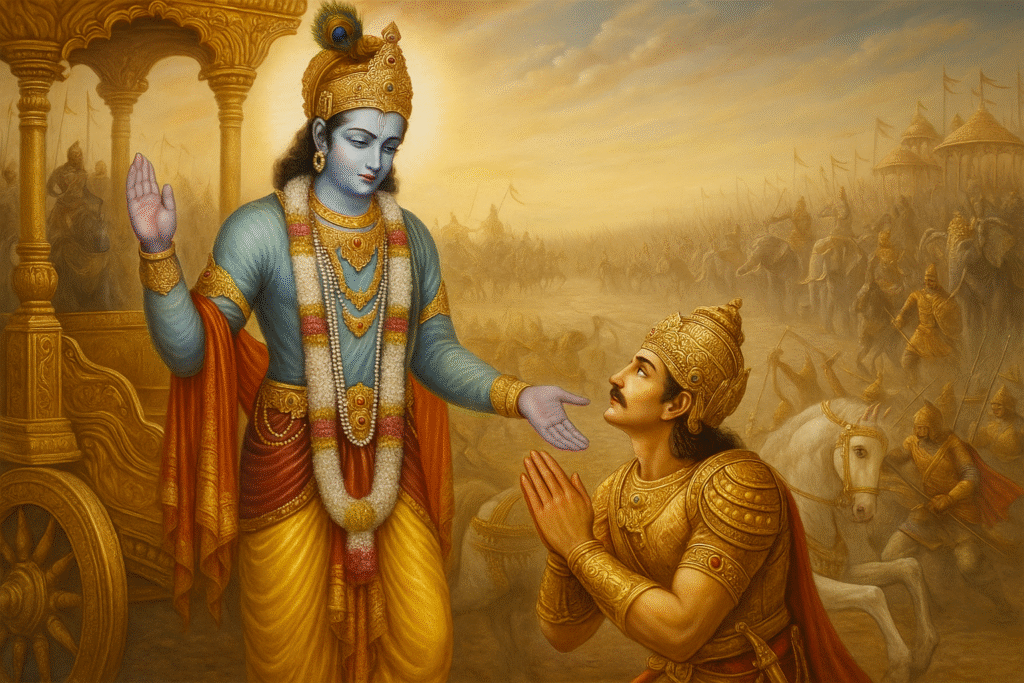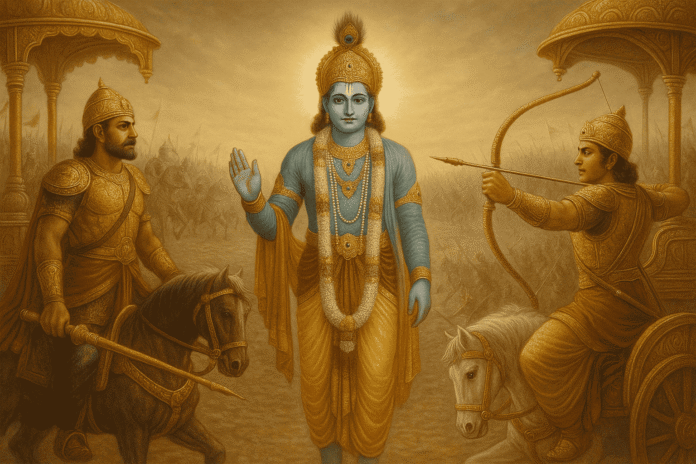Was the Mahabharata War Justified?
A Spiritual View of Krishna, Dharma and the Bhagavad Gita
The Mahabharata War is considered to be one of the greatest and most destructive wars in human history. A common question that arises is:
👉 Could this war have been avoided?
👉 Did Lord Krishna instigate the war, or was it actually necessary to protect Dharma?
Some have accused Krishna of promoting violence, calling him “aggressive” or “destructive.” But is this accusation based on truth?
In this article, we will explore the real essence of the Mahabharata War from the perspective of Lord Krishna, Dharma and the Bhagavad Gita.
Could the Mahabharata War have been avoided?
Very few people know that Lord Krishna made every possible effort to avert the war. As an emissary of peace, he went to the court of Hastinapur and placed a very humble request before Duryodhana:
“We don’t want the kingdom. Just give the Pandavas five villages, so that they can earn their livelihood.”
But driven by arrogance and ego, Duryodhana boldly declared:
“I will not give them even a needle’s point of land!”
It was clear that there was no room left for peace.
Warrior Code and the Need for War
At that time, there were no modern courts or legal systems. The Kshatriyas (warriors) followed a sacred code: to fight against injustice and protect Dharma.
The Pandavas had no other option.
To remain silent in the face of gross injustice would mean the defeat of Dharma and the rise of Adharma.
When all attempts at peace fail, taking up arms becomes an act of Dharma.

Krishna – Symbol of Truth, Not Man
It is a mistake to see Krishna as just a historical figure. He represents cosmic truth.
Every action and word of Krishna was meant to establish dharma and uphold justice.
When Krishna says, “Those who do not follow my vision perish,”
He is not speaking of individual views – He is speaking as the voice of eternal truth.
The Viewpoint of the Bhagavad Gita
One of the most powerful statements in the Bhagavad Gita, Chapter 3, Verse 32 is:
“Ye twetaad abhayasuyanto naanutishthanti me matam |
sarva-jnana-vimudhaan viddhi nashtaan achetasah ||”
Meaning (Explanation by Acharya Prashant):
Those who reject the truth due to ignorance and ego will not perish in the future –
They have already perished.
Their consciousness has already died.
This shloka makes it clear that those who live only under the influence of ego, ignorance and materialistic tendencies are spiritually dead even while they are alive.
So, the real question that arises is:
If someone is already spiritually and morally dead, can killing him be called violence?
Were Duryodhana and his associates already destroyed?
People like Duryodhana, Shakuni and Karna were heading towards their own destruction.
Krishna only paved the way for the victory of Dharma.
He did not provoke the war – He attempted to prevent it. But when truth is rejected, war becomes the only remaining means of justice.
✅ Conclusion
The Mahabharata war was not just a political conflict.
It was a cosmic war between truth and untruth, Dharma and Adharma.
Lord Krishna did his best to avert the war. But when ego blinded the minds of the unrighteous and peace was rejected, war became a spiritual necessity.
This story teaches us an eternal truth:
“When untruth tries to suppress truth, it is a sin to remain silent.
To protect dharma is the highest duty.”

